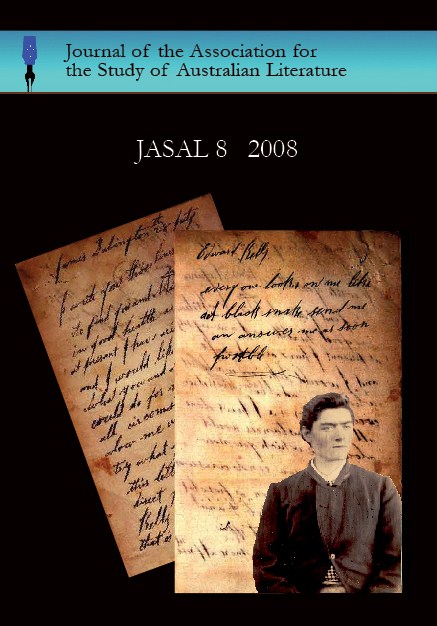'Our Own Way Back': Spatial Memory in the Poetry of David Malouf
Keywords:
David Malouf, poetry, space, memory, postcolonialismAbstract
Much of David Malouf’s writing enacts what may be referred to as 'spatial memory'. His poetry utilises a uniquely 'layered' time-perspective in which Malouf repeatedly revisits places of personal significance over numerous collections and, through memory and imagination, imbues these spaces with mythological significance. This process can be seen as a direct response to what Malouf perceives as 'the need to remap the world so that wherever you happen to be is the centre'. Although it may at first appear as simply an autobiographical phenomenon, this process of 'spatial memory' is also revealed as significant on a broader social level, as part of Malouf’s longstanding project of redefining Australia, in the eyes of its inhabitants, as a significant cultural and literary centre. When Malouf began publishing in the nineteen-sixties, his poetry, as well as his first novel Johnno, focused on the tension between the percieved 'provinciality'of Australia and the 'exoticism' of the cultural and colonial centres of England and Europe. It is arguable that Malouf's literary remapping of centre and edge is still pertinent today, though now in relation to the increasing cultural dominance of the United States. This essay examines the role of 'spatial memory' in Malouf’s poetry, focusing in particular on his numerous poems devoted to the area around Moreton Bay. It demonstrates the process by which these poems of personal memoir become significant on the broader level of social memory, and draws this exploration into a discussion of Malouf’s politics of space and memory.Downloads
Published
2008-06-17
Issue
Section
Articles
License
The copyright for articles in this journal is retained by the author(s), with first publication rights granted to the journal. By virtue of their appearance in this open access journal, articles are free to use with proper attribution in educational and other non-commercial sectors.Attribution-NonCommercial-ShareAlike 2.1 Australia
This work is licensed under the Creative Commons Attribution-NonCommercial-ShareAlike 2.1 Australia License. To view a copy of this license, visit http://creativecommons.org/licenses/by-nc-sa/2.1/au/ or send a letter to Creative Commons, 543 Howard Street, 5th Floor, San Francisco, California, 94105, USA.
How to Cite
’Our Own Way Back’: Spatial Memory in the Poetry of David Malouf. (2008). Journal of the Association for the Study of Australian Literature, 8, 92-106. https://openjournals.library.sydney.edu.au/JASAL/article/view/9736

